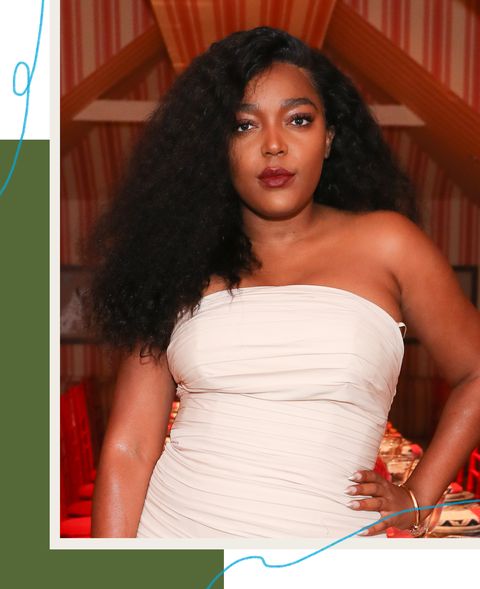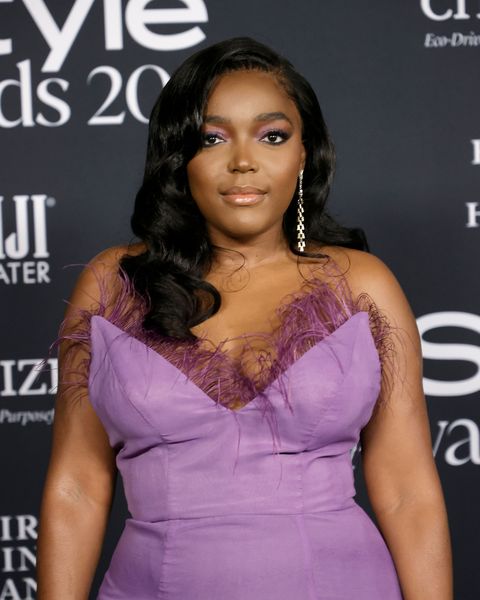Black people are often called resilient. We continue to survive the unthinkable while leaving the world more beautiful and equitable than we found it. More than resilience, it’s our innovation and ability to see what is not yet present—justice, joy, autonomy—and bring it to life. Anifa Mvuemba knows this. As one of the most innovative designers in the fashion industry and the founder of the brand Hanifa, her creative eye and business prowess have led her to dress top fashionistas including Zendaya, Trace Ellis Ross, Bella Hadid, and more. ELLE.com sat down with Mvuemba to unpack her Congolese roots, her U.S. upbringing, and how her imagination has led the Hanifa brand to new heights.
How did your time at Morgan State impact your perception of Blackness and the vastness of the diaspora?
If I went to a different school, I wouldn’t have experienced Blackness in the way that I did. The HBCU experience is unmatched! At Morgan State, I was so young and still trying to figure out who I was and where I wanted to be. My time at Morgan was a stepping stone, not just for me. A lot of people don’t even know about Congo and in a lot of my friend groups, I’m the only Congolese person that they know.
Do you see yourself as a bridge between the African diaspora and the African continent?
With [Hanifa’s fashion collection] Pink Label Congo, I was happy to shed light and bring awareness, so there’s a lot I want to do with Congo! At the same time, I’m still in the process of understanding and learning about my roots.
Speaking of diaspora, travel is also clearly a love of yours. I especially love all of your Dubai escapades! How has exploring the world influenced the way you design?
My parents have always traveled a lot, but in 2005 my brother was murdered in Maryland, and it was a really difficult time for my family. We were invited to Dubai by a family friend to get away and refresh. I was a freshman in high school, so I wasn’t actually thrilled then about the trip because my world was already changing so much. But when I look back on my time there, it’s clear to me that my perspective on life shifted. You meet so many people from all walks of life, religions, and racial backgrounds. The inspiration I got was insane.
I’m so sorry to hear about the loss of your brother, but I’m so glad that you had that time to take care of yourselves as a family. Would you say that resting and taking time off for inspiration remain important to you even now?
I’m getting better at it… I’ve found that it’s definitely about finding that balance, which can be difficult when your team really depends on you. There are seasons where I take off for two weeks and other seasons where I’m working nonstop. Now, I have a business coach, and I’m making time for mental work days where I’m not on calls or talking to anyone. It gives me time to process my thoughts and show up as a better leader and creative for my team.
You definitely stay busy so it’s great to know that you’re so intentional about self-care. I want to jump into some of your most jaw-dropping moments, which have been at the intersection of tech and fashion—two industries that can seem so far apart. Where does this passion stem from in you, and in what ways do you want to continue leveraging one for the other?
It’s really cool, because if I wasn’t in fashion, I’d probably be building computers somewhere. Since Myspace and early blogging days, I’ve been obsessed with coding and how tech functions. It was divine timing when [Pink Label Congo] happened in 2020. [Editor’s note: In May 2020, Mvuemba debuted her collection Pink Label Congo with 3D renderings on Instagram Live.] I was already back and forth on whether to do a virtual or in-person show and when the world shut down [because of COVID-19], it became a no brainer. Getting to merge both passions is a dream come true. Now we’re seeing these two worlds collide now more than ever through digital avatars, the metaverse, and more. I hope to always be innovating in this space.
That wouldn’t be surprising to me. You’ve been intentionally shifting the fashion world to be a more inclusive place in many senses of the word—including more geographic regions, giving non-celebrities or industry leaders access to your shows, and being intentional about sizing and model casting. Have you always been this way or was there a point in your career where you felt “successful enough” to disrupt the status quo and change the rules?
It was really difficult for me entering the industry because I didn’t have the traditional fashion background or those resources. I read so many articles and Googled YouTube videos to understand how to break into this industry, but I had to figure out how I was gonna do it and do it my way. Rejection led me to have this mindset of transforming the industry, but I also have to thank social media. At the beginning in 2011, I was on Instagram and posted my first dress back when the platform was really new. Social media has opened up new paths for designers. Now that I’m more secure in my place in the industry, I also work hard to create more opportunities for those coming behind me. There are so many programs supporting new and upcoming designers, and I’m building that out now.
Out of everyone who has worn Hanifa, who do you get most geeked about?
Michelle Obama wore a custom piece and I screamed! THE Michelle Obama! That was super surreal. Also, Beyoncé wore an Alia dress on a vacation.
You must be over-the-moon proud! In many ways, you and your brand are so synchronized, from the name of the brand to posting your first design on your birthday many years back. As you continue to climb in the industry, how do you distinguish Anifa the woman from Hanifa the company?
That’s a great question! I always talk about Hanifa growing with me, and we’re both becoming what I’ve always wanted us to be. I’ve always been connected to my brand, but recently I’ve been trying to figure out what it would look like to separate the two more. A lot of people learned about Anifa from the creativity side, but I also want people to know the business side as well. This mentorship program we’re building out will be an extension of that.
What are some up-and-coming Black-owned brands that excite you or that are reclaiming Black joy and art in innovative ways?
Fisayo Longe is the founder and CEO of KAI Collective, a U.K.-based brand. Our paths align, and she’s doing a lot of creative and cool things, so I’m really excited to see what she’s going to do with her brand. This year, I attended the Fifteen Percent Pledge Gala, and it was so inspiring to see a room full of Black creatives, Black designers, and Black business owners. I’m really excited to see more of that.
This interview was lightly edited for clarity.
This story was created as part of Future Rising in partnership with Lexus. Future Rising is a series running across Hearst Magazines to celebrate the profound impact of Black culture on American life, and to spotlight some of the most dynamic voices of our time. Go to oprahdaily.com/futurerising for the complete portfolio.


